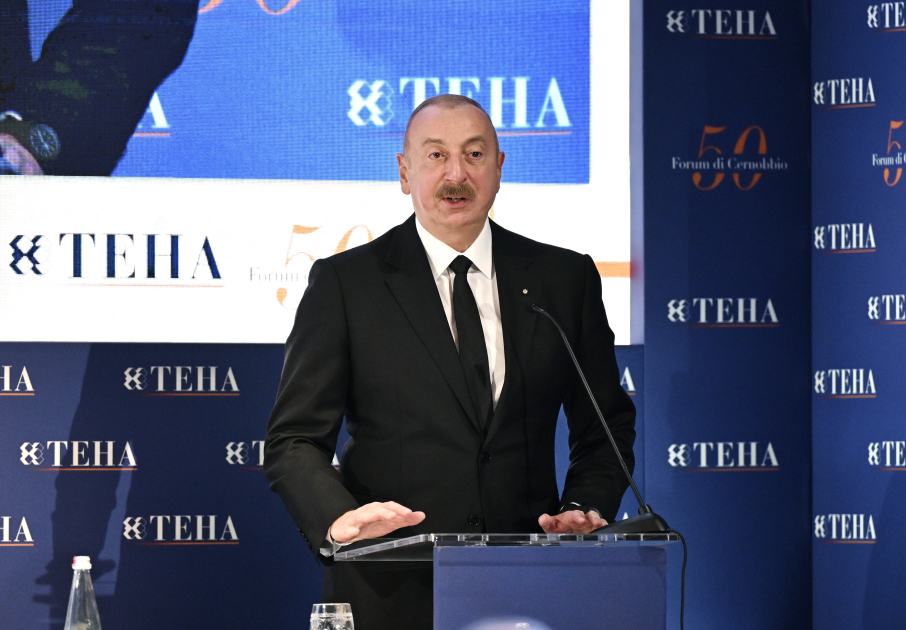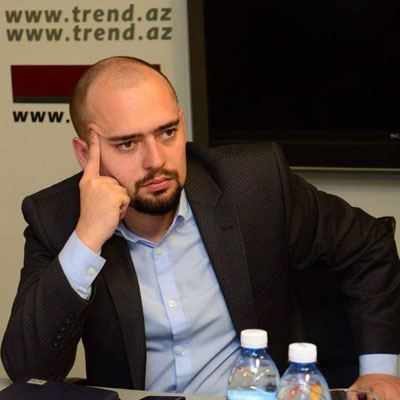CERNOBBIO, Italy, September 6. Italy and Azerbaijan have already worked as strategic partners for many years and the corresponding declaration was adopted almost ten years ago. Our cooperation covers many areas, we have regular political contacts, said President Ilham Aliyev as he addressed the session titled “Azerbaijan's role in the new geopolitical environment” at the International Cernobbio Forum, Trend reports.
Speech by President Ilham Aliyev
- Distinguished ladies and gentlemen.
First, I would like to express my gratitude to the organizers for the invitation. This is the second time I am participating in the Cernobbio Forum. I have very good memories of my being here two years ago. Once again, thank you for inviting me.
I came here from Rome, where yesterday I had meetings with President Mattarella, who made a great speech this morning, and Prime Minister Meloni. During our meetings and discussions, we once again reconfirmed the strategic character of our bilateral ties. Italy and Azerbaijan have worked as strategic partners for many years. The corresponding declaration was adopted almost ten years ago. Our cooperation covers many areas. We have regular political contacts. This is my third visit to Italy since 2020, and President Mattarella paid a visit to Azerbaijan in 2018. High-level contacts demonstrate that we are very close partners.
We have very active trade cooperation. Italy is Azerbaijan’s number one trading partner in the world. Last year, our trade turnover was close to 16 billion US dollars. We see potential for growth not only in the energy sector but also in other sectors. Azerbaijan is the Italy’s number one oil supplier and number two gas supplier. This is also an important part of our cooperation.
Energy supplies today clearly demonstrate that national security cannot be separated from energy security. The 3,500 km integrated pipeline system from Azerbaijan to Italy, known as the Southern Gas Corridor, today ensures energy security for ten countries. We now have ten countries receiving gas from Azerbaijan, seven of which are members of the European Union. That is probably why the European Commission calls Azerbaijan a pan-European gas supplier and a reliable partner.
But as I said, the pipeline starts in Azerbaijan and ends in Italy. But its route, with extensions and interconnectors, covers a broad European and Eurasian geography with strong growth potential. Today we are in a process of negotiations with at least three European countries with respect to gas supply.
Of course, energy and trade are not the only part of our bilateral agenda. We are also actively working on humanitarian issues. The Italy-Azerbaijan University, which has already started functioning, is a great example of the diversification of our cooperation. Five leading Italian universities like Luiss, Sapienza, Bologna, Milan, and Torino, and Azerbaijan’s ADA University, have created this joint venture, which will be instrumental in our future cooperation. The students who are already studying and those who will study there will naturally be connected to Italy. They will know the Italian language, Italian culture and the great historical heritage of the Italian people.
I start my introduction with this important bilateral part because it demonstrates that when relations are built on mutual trust, mutual respect, and recognition of mutual interests, then we see a progress. That is how relations must be built between countries, which are situated far from each other and belong to different continents.
Talking about the geopolitical situation - because the topic of my introduction was exactly the role of Azerbaijan in the changing geopolitical environment – first of all, I would like to say that the biggest geopolitical change, not only in the Caucasus but in the broader region, was the restoration of Azerbaijan’s territorial integrity and sovereignty, which really demonstrates that international law can prevail, not only when a legal framework exists but also when you have courage and real strength.
For 30 years, our internationally recognized territories were under Armenian occupation. Despite numerous decisions and resolutions by international organizations, including four legally binding United Nations Security Council resolutions demanding the immediate withdrawal of Armenian forces from our lands, the occupation continued. The OSCE created a special group in order to tackle this issue. For 28 years, this group produced zero results. This demonstrates that international law alone is not enough to ensure justice and peace. So you must have other factors on the table.
In 2020, a large part of our then-occupied territories was liberated during the 44-day Patriotic War. But that was not the end of the story, as separatists continued to undermine sovereignty of Azerbaijan. Last September, it was the last full stop when sovereignty of Azerbaijan was totally restored. The conflict actually ended as it should have.
This is a good example for many other countries, which struggle for their territorial integrity and sovereignty without success. In our case, I think Azerbaijan demonstrated that international law, along with strong political will, consolidation of the society, and physical strength, can make a serious geopolitical change. After that, for the first time since the collapse of the Soviet Union, we can achieve peace in the Southern Caucasus. It is reachable. The latest developments in the negotiation track between Azerbaijan and Armenia demonstrate that. We are actively continuing negotiations, with almost 80 percent of the peace treaty paragraphs having been approved. We have already started not only the border delimitation process, but also demarcation. Yes, it’s a first small step. Only about 13 kilometers of our border, which is more than 1000 kilometers. But it is a step in the right direction.
We hope that Azerbaijan’s initiative to start peace negotiations will result in a peace treaty that will be important not only for the Southern Caucasus but for all parts of the world. That will be an example of how countries that have fought for 30 years, with Azerbaijan suffering from aggression and the total devastation of almost 20 percent of its territory, can work together to achieve peace.
The final point which I want to raise in my introductory comments is that, in two months, we will host the largest climatic conference, COP29. The decision was made last December. We have had less than one year to prepare. It is important that the decision was made by consensus of almost 200 countries. We consider it as a sign of respect for Azerbaijan. For the first time in history, COP will be held in our region.
We are actively working in order to build bridges between different actors on the global arena. As we all know, the climatic topic is something, which divides countries and peoples. There are mutual claims and accusations about who is more responsible for damaging the planet and who has to pay more ant etc. While not being a major actor on international arena, I think it is achievable for us to build bridges between the Global South and the Global North.
I also want to underline that through active cooperation with many European countries, including ten members of the European Union, which are Azerbaijan’s official strategic partners and as the Chair of the Non-Alignment Movement for four years, which unites 120 countries, we can be a country, which can produce good results.
These are the topics I wanted to address during my introduction. Once again, thank you for giving me the opportunity to address this audience.







